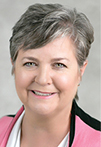By GAIL APPLESON
More than two decades ago, Bonnie Price, an emergency room nurse at Bon Secours Health System's St. Mary's Hospital in Richmond, Va., was eating lunch in the break room when a pamphlet about forensic training caught her eye. That was back in 1993, well before the term Sexual Assault Nurse Examiner (SANE) became commonplace. But Price had seen enough in the emergency room to know there was a real need, so she signed up and went for the training.

Price
In November of that year, Price became one of three nurses who launched the Bon Secours SANE program, the first of its kind in Central Virginia.
Today, Price directs the Bon Secours Richmond Forensic Nursing Program. Her advocacy and compassion for victims led her to play a pivotal role in the creation of the region's first dedicated shelter for female human trafficking victims.
The Central Virginia Emergency Shelter for Human Trafficking Victims opened its doors on Jan. 10 and took in its first client the same day. It's sheltered and provided services to 15 women in total this year. The shelter was established through a partnership between Bon Secours Richmond Health System and Safe Harbor, an agency that serves victims of sexual and domestic violence. Bon Secours Richmond helped open Safe Harbor in the late 1990s.

Easter
Cathy Easter, Safe Harbor's executive director, said a U.S. Department of Health and Human Services study on programs for human trafficking victims found that human trafficking victims may be best served in dedicated facilities where services are clustered and staff is specially trained to respond to victims of complex trauma.
Price said that helping the vulnerable, including victims of trafficking and sexual and domestic violence, is part of Bon Secours' mission.
The eight-bed trafficking victim facility for women, based in a confidential location, grew out of talks last year between law enforcement, attorneys, forensic nurses, victim advocates and social service providers.
"We kept hearing 'we need a shelter, we need a shelter, we need a shelter,' so we brought all of the players together," said Price. "It went from dreaming to a reality in a very short period of time."
In addition to safe housing, shelter residents receive both emergency and primary medical care from Bon Secours nurses. They also have the support of Safe Harbor staff, who provide counseling and help them complete education, learn life skills, obtain employment and find their own homes.
"It's not just a place to live but a place to heal," said Easter. "It's a total package to help them move on to the next chapter of their lives."
Safe Harbor received a grant of $500,000 from the U.S. Department of Criminal Justice Services VOCA New Initiative Victim Assistance Grant Program to open the shelter. (VOCA is an acronym for the federal Victims of Crime Act of 1984.) The grant helped the agency hire staff and purchase essential equipment and supplies.
Price said that Richmond is a central location in the route human traffickers use to bring women to the northeast from the south and Midwest.
In fact, the Henrico County Commonwealth Attorney's Office has prosecuted more cases involving human trafficking offenses than any other jurisdiction in the Commonwealth of Virginia, according to Henrico County Deputy Commonwealth's Attorney Michael Feinmel. While Henrico County is the shelter's primary service territory, victims also will be referred from localities throughout the Central Virginia region, including the counties of Albemarle, Chesterfield and Hanover and the city of Richmond.
In partnership with the U.S. Department of Homeland Security, the shelter also is open to house federal crime victims including international victims of human trafficking. To date, all shelter residents have been U.S. citizens.
Price said that about a year and a half ago Bon Secours started recording the number of trafficking victims seen in the emergency room and there were about 61 female victims from about age 14 to 23.
"They may come to the hospital and not even know what city they are in," said Price. "The traffickers keep moving them so they don't get caught."
The women are often lured into the trafficking operations by men who pretend to be their boyfriends, she said. Some women come from stable backgrounds and are college students or graduates.
"They think that person is going to take care of them. The coercion they (traffickers) use to manipulate them is sad and devastating."
Copyright © 2017 by the Catholic Health Association
of the United States
For reprint permission, contact Betty Crosby or call (314) 253-3490.